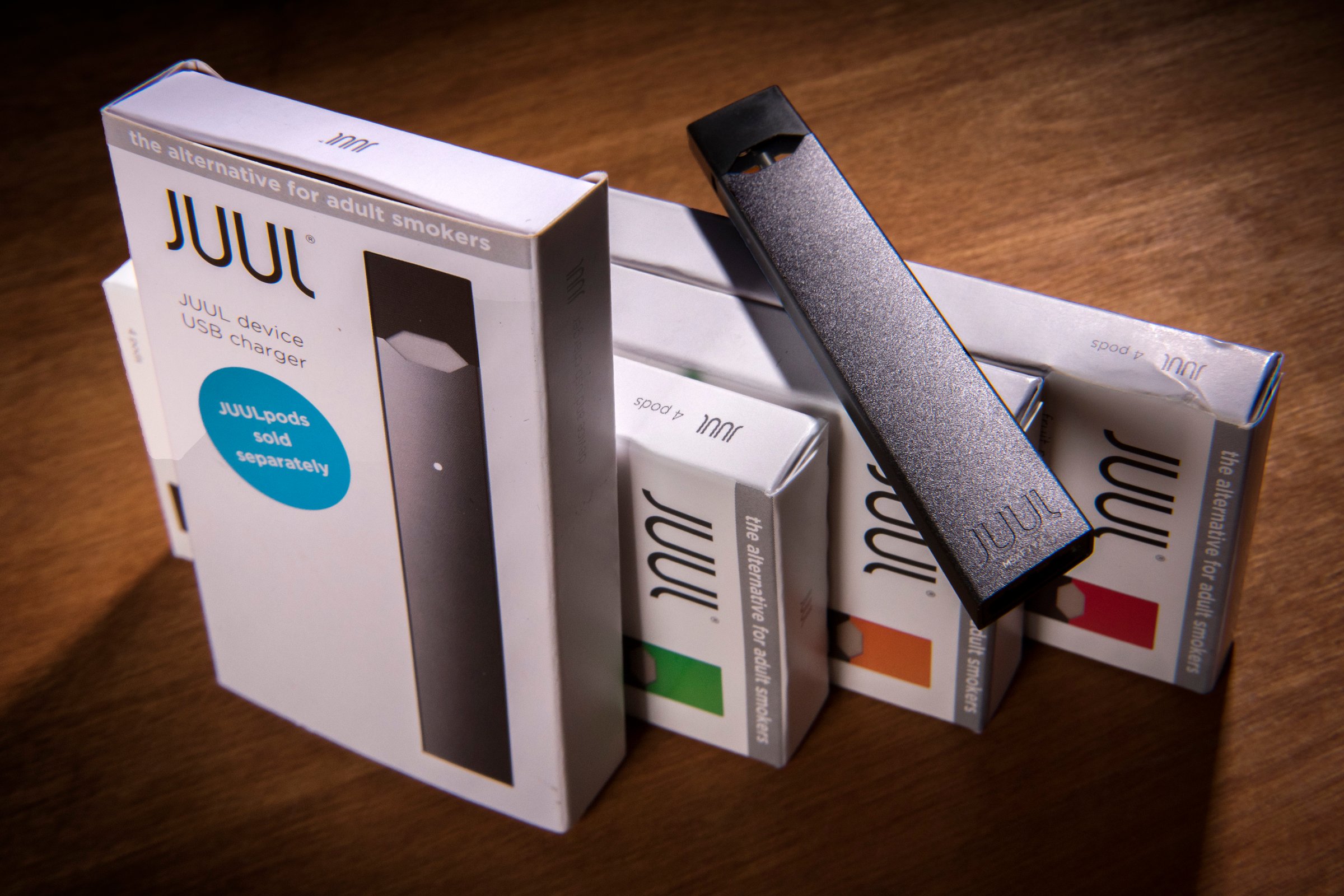
The Food and Drug Administration (FDA) is giving vaping companies 60 days to figure out how to reverse what it’s calling an epidemic of youth usage, or risk having some of their products potentially pulled from the market.
This is the latest in a series of steps the FDA is taking to limit children’s use of e-cigarettes, which has “reached an epidemic proportion” in the U.S., FDA Commissioner Dr. Scott Gottlieb announced Wednesday. The agency may also ban sales of some flavored e-cigarette products, which Gottlieb says are particularly appealing to underage users, and consider shortening a grace period that currently gives e-cigarette companies until 2022 to apply for FDA approval.
Despite the fact that they cannot legally be sold to anyone under 18, e-cigarettes — hand-held vaporizers that create aerosols from liquids typically packed with nicotine and other chemicals, often including flavorings — are now the most popular tobacco product among high school students, recent federal data shows.
In an effort to reverse that trend, the FDA on Wednesday sent letters to manufacturers of five e-cigarette brands often used by kids — Juul, Vuse, MarkTen XL, Blu and Logic — requesting that they draw up plans for limiting youth access to their products within 60 days. Failing to do so, or making unsatisfactory efforts, “could mean requiring these brands to remove some or all of their flavored products that may be contributing to the rise in youth use from the market until they receive premarket authorization and otherwise meet all of their obligations under the law,” the FDA statement says.
“JUUL Labs will work proactively with FDA in response to its request. We are committed to preventing underage use of our product, and we want to be part of the solution in keeping e-cigarettes out of the hands of young people,” Juul spokesperson Victoria Davis said in a statement provided to TIME. “Our mission is to improve the lives of adult smokers by providing them with a true alternative to combustible cigarettes. Appropriate flavors play an important role in helping adult smokers switch. By working together, we believe we can help adult smokers while preventing access to minors, and we will continue to engage with the FDA to fulfill our mission.”
A statement from Fontem Ventures, Blu’s parent company, says it is “evaluating today’s request and statement from the FDA. On youth access, we have common aims. We welcome the opportunity to demonstrate, and work with the FDA to further strengthen, our youth access prevention policies and procedures.”
“We share Commissioner Gottlieb’s concerns and applaud his approach to eliminating youth usage of all tobacco products,” a spokesperson for R.J. Reynolds Vapor Company, which makes Vuse, said in a statement provided to TIME. “Youth tobacco prevention is a priority for our companies. We will provide the Agency with a comprehensive plan in 60 days as it requested in its letter to us. We look forward to working with FDA and other stakeholders to address this important public health issue.”
The other two companies contacted by the FDA did not immediately respond to TIME’s requests for comment.
The FDA also sent more than 1,300 warning letters and fines to retailers found to be selling vapes to minors during an “undercover nationwide blitz” this summer. Additionally, 12 online retailers were found to be selling vaping products that were “misleadingly labeled and/or advertised e-liquids resembling kid-friendly food products,” in violation of an earlier order from the FDA, and were also slapped with warning letters, according to the announcement.
E-cigarettes are typically intended and marketed as cigarette alternatives for adult smokers, but it’s unclear how effectively they help smokers quit the habit. And while they do contain fewer harmful chemicals than traditional cigarettes, researchers still don’t know exactly how e-cigarettes affect long-term health.
The actions are the latest in the FDA’s continuing efforts to limit youth access to tobacco products, namely e-cigarettes. This spring, it requested marketing information from several leading vaping companies, in an effort to better understand why kids are attracted to their products. E-cigarettes came under the FDA’s regulatory purview in 2016.
“While we remain committed to advancing policies that promote the potential of e-cigarettes to help adult smokers move away from combustible cigarettes, that work can’t come at the expense of kids,” Gottlieb said in the FDA statement. “We cannot allow a whole new generation to become addicted to nicotine.”
More Must-Reads from TIME
- Why Biden Dropped Out
- Ukraine’s Plan to Survive Trump
- The Rise of a New Kind of Parenting Guru
- The Chaos and Commotion of the RNC in Photos
- Why We All Have a Stake in Twisters’ Success
- 8 Eating Habits That Actually Improve Your Sleep
- Welcome to the Noah Lyles Olympics
- Get Our Paris Olympics Newsletter in Your Inbox
Write to Jamie Ducharme at jamie.ducharme@time.com